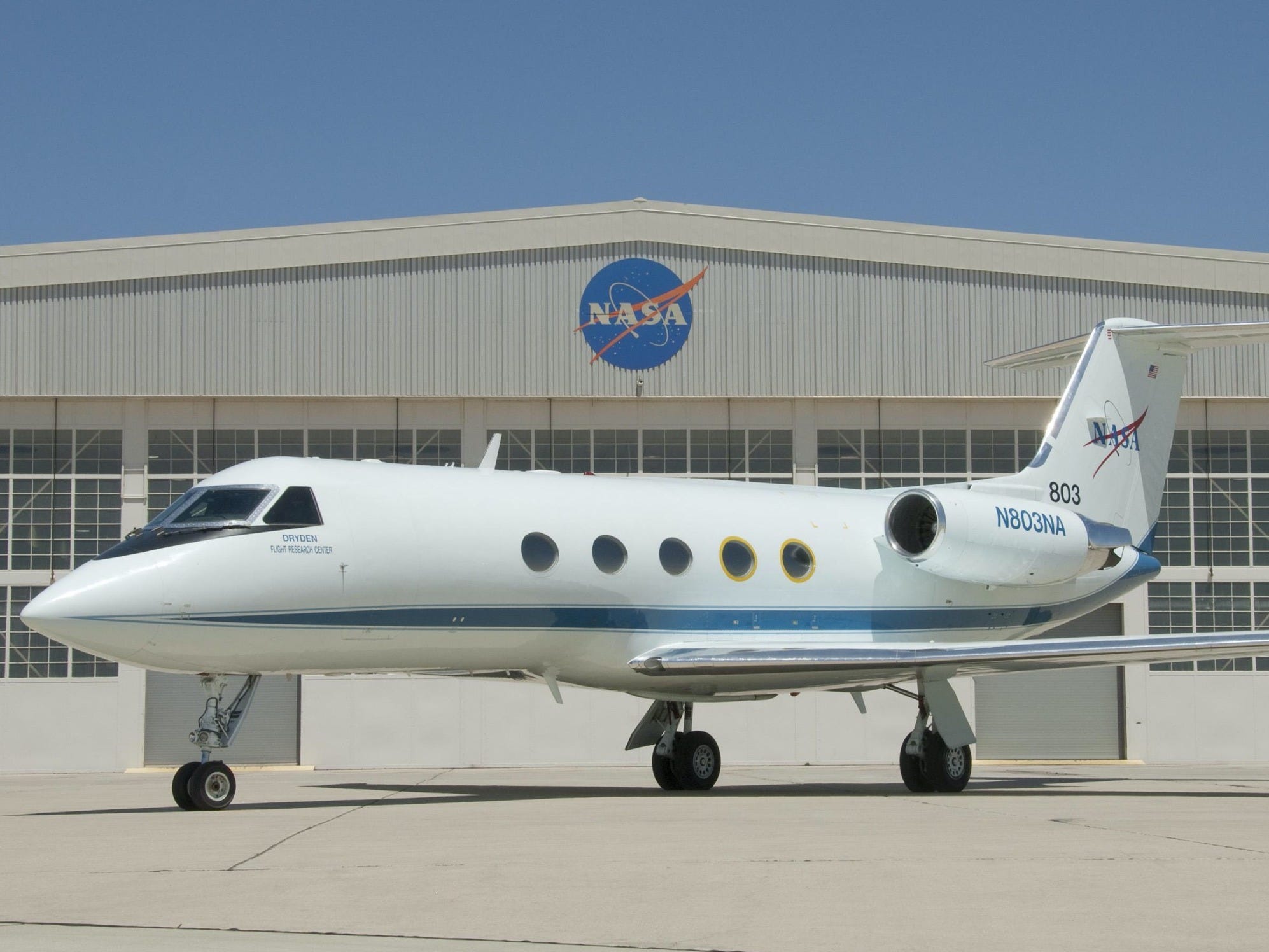- NASA operates a fleet of Gulfstream private jets most notably seen when flying astronauts to the Kennedy Space Center in Cape Canaveral, Florida.
- Shuttling astronauts is just one of the missions that the Gulfstream are tasked with as the jets are also used to perform scientific research across the globe.
- Gulfstreams also doubled as Space Shuttles during pilot training when the program was still active.
- Visit Business Insider’s homepage for more stories.
When they’re not in space, NASA astronauts fly around the world in style.
As the leading US private jet manufacturer, Gulfstream is very popular with the US government. Not only does the US Air Force and nearly every branch of the military have Gulfstreams in their fleet but NASA also sports the luxury business jets, used for a wide array of missions that includes flying astronauts to launch sites.
When NASA astronauts Bob Behnken and Doug Hurley flew from Houston to Cape Canaveral, Florida in preparation for their historic launch on SpaceX’s Demo 2 rocket, they did so on one of NASA’s Gulfstreams. But shuttling VIPs between NASA facilities is only one of the important missions for the private jets.
The space agency uses its fleet of aircraft, including the Gulfstreams, primarily for scientific research under the NASA Airborne Science Program. Missions include surveying polar ice in the Arctic and Antarctica, as well as studying the impact of wildfires on the climate.
- Gulfstreams also doubled as Space Shuttles during pilot training when the program was still active.
Take a closer look at the NASA Gulfstream fleet.
NASA's Gulfstream fleet consists of the Gulfstream C-20A, Gulfstream III, and Gulfstream V models.

Source: NASA
The C-20A the military equivalent of the Gulfstream III.

Read More: The US military has a fleet of modified Boeing and Gulfstream VIP private jets - here's what they do
These jets were acquired from the US Air Force so they still sport the classic blue and white livery with a gold cheatline.

They're near-identical to the current Air Force Gulfstreams still flying government VIPs.

The other jets are NASA-modified civilian jets from Gulfstream that look no different than standard private jets like this Gulfstream III,

And a Gulfstream V similar to this one.

The jets are most well-known for shuttling astronauts. After all, they do fly for the National Aeronautics and Space Administration.

Here's the crew for the last Space Shuttle mission arriving at the Kennedy Space Center in 2011.

NASA then acquired the Gulfstream III aircraft to fly astronauts from Kazakstan back to the US after stints on the International Space Station, a mission later taken over by the long-range Gulfstream V.

Source: NASA
Better to fly 7,000 miles in a Gulfstream than a commercial airliner with a connection.

Nine years following the last Space Shuttle launch, when the US next launched astronauts into space, the Gulfstream made a return appearance after flying Bob Behnken and Doug Hurley from Houston to Cape Canaveral.

The Gulfstreams are usually reserved for the final flight from Texas to Florida. Astronauts are often flown or fly themselves in NASA's T-38 jets used for training otherwise.

Source: NASA
The Gulfstreams also played a key role in training astronauts to fly the Space Shuttle.

Source: NASA
Now-retired Gulfstream II aircraft doubled as the Space Shuttle to train astronauts on how to land the aircraft after re-entering the Earth's atmosphere.

Source: NASA
The Space Shuttle, which has a design similar to an airplane, would glide down to the runway and land like a normal plane when it came back to Earth.

Even the cockpit on the Space Shuttle looks similar to an airplane's.

But flying astronauts is only one part of the mission for NASA's Gulfstreams as the jets play a key role in the Airborne Science Program.

"The NASA Airborne Science Program provides a unique set of NASA supported aircraft that benefit the earth science community," NASA's website says. "These manned and unmanned aircraft carry the sensors that provide data to support and augment NASA spaceborne missions."

Source: NASA
NASA's website lists at least 40 missions over the years that its aircraft have performed which include tracking polar ice and the effect of wildfires on the climate, among others.

Source: NASA
That's why some jets will have some interesting add-ons, like this pod strapped to the bottom of a C-20A. Engineers are testing the airflow around the pod here.

Source: DVIDS
NASA's jets can be found all over the world performing scientific research. Here's the Gulfstream III in Greenland.

While flying on a multi-million dollar private aircraft, researchers aren't treated to the normal luxury interior that's instead replaced with monitors, computers, and other equipment.

The iconic staples of flying on a Gulfstream jet, however, remain, including the large, round windows.

Despite their look, the jets are far from new. This Gulfstream III is from 1980 and requires an engine add-on called a "hush kit" to keep noise levels down.

Source: FlightAware
The Gulfstreams join other NASA aircraft like the Lockheed U-2...

Source: NASA
Douglas DC-8...

Source: NASA
Boeing 747SP...

Source: NASA
And Lockheed P-3 Orion.

Source: NASA
Each provides NASA with a different specialty, with the U-2 capable of flying high-altitude missions up to around 70,000 feet.

The flagships, however, will always be the Gulfstreams and with space flight coming back to the US, the public will be seeing a lot more of them.


